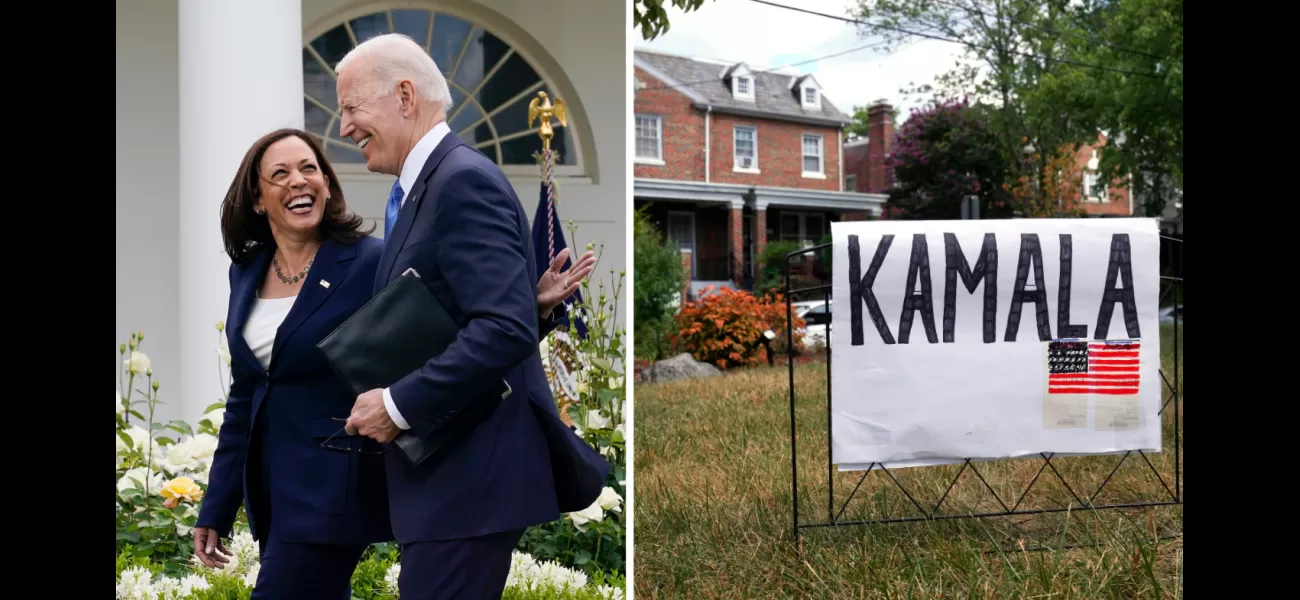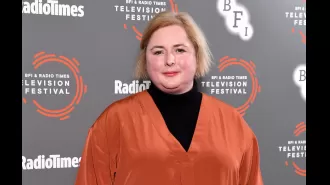Kamala Harris's remarkable ascent to the presidency.
The US Vice President is next in line for Joe Biden, but her selection is not guaranteed.
July 21st 2024.

In a historic move, US Vice President Kamala Harris announced her plans to seek the Democratic nomination for President after President Joe Biden stepped aside and endorsed her. This could potentially make her the first Black woman and first Asian American to lead the ticket of a major political party.
In a statement, Harris expressed her gratitude for Biden's endorsement and stated that her intention is to earn and win the nomination. This came after weeks of disarray within the Democratic Party, with Biden's disastrous debate performance raising doubts about his ability to secure a second term.
Biden's endorsement and Harris's pledge to unite the party behind her marked a significant moment in the race for the Democratic nomination. The President stated, "My very first decision as the party nominee in 2020 was to pick Kamala Harris as my Vice President. And it's been the best decision I've made. Today I want to offer my full support and endorsement for Kamala to be the nominee."
Despite Biden's backing, there is still uncertainty about whether Harris will become the nominee and what process the Democratic Party will take to select an alternative. The decision will ultimately be up to the delegates at the party's national convention. While Harris's allies have been working to secure her path to the nomination, there are some Democrats who have not explicitly backed her or have called for an open nomination process.
Democratic National Committee chairman Jaime Harrison stated that the party will undertake a transparent and orderly process in the coming days to move forward as a united Democratic Party with a candidate who can defeat Donald Trump in November.
Logistically, Harris is the natural successor to the ticket as Biden's running mate. The Biden-Harris campaign formally amended filings with the Federal Election Commission, renaming its principal committee as "Harris for President." The committee also filed a letter stating that Harris is now a candidate for United States President in the 2024 election and will conduct campaign activities solely for that office.
However, control of the campaign's war chest, which totaled US$95.9 million at the end of June, depends on whether Harris remains on the Democrats' 2024 ticket. Recent polling has also shown her performing better against former President Donald Trump, the Republican nominee, than Biden and other potential Democratic contenders.
Should there be efforts to pass over Harris in favor of Democrats seen as likely to run in 2028, there may be backlash from the vice president's supporters and prominent Black Democrats. But Harris has also experienced a renaissance within her party, with Democrats showering her with praise following the debate.
Throughout her vice presidency, Harris has faced challenges in defining herself while handling difficult issues such as voting rights and immigration. On these fronts, she has faced criticism from both sides, with some saying she has not done enough and others accusing her of being too harsh. However, in recent weeks, Harris has become a key surrogate for Biden's re-election campaign, focusing on reproductive health and the threat Trump poses to democracy.
Harris's allies argue that much of the criticism she faces is a result of racism and sexism against the first woman of color to hold such a position in the country. They believe that now, the rest of the country is finally seeing what her allies have known for years.
LaTosha Brown, a co-founder of Black Voters Matter, a progressive group that works to boost Black voter turnout, stated, "Oftentimes Black women are not seen until they're needed. We've seen her constantly berated, marginalized, questioned. I think that the shift is because there's a need."
Harris's background and rise in politics have been nothing short of remarkable. The daughter of Berkeley political activists and immigrants from India and Jamaica, she grew up in Oakland and spent much of her political career in California's Bay Area. After earning her law degree, she served as a prosecutor in various offices before being elected as California's attorney general, making her the first woman, first Black person, and first Asian American to hold the position.
However, Harris's record in law enforcement has been both a boon and a burden to her political campaigns. One of her more controversial policies, a truancy program, received backlash, and she later expressed regret for its unintended consequences. In 2016, Harris won her bid to succeed outgoing California Senator Barbara Boxer, becoming the second Black woman to ever serve in the US Senate.
As a senator, Harris gained attention for her prosecutorial style during hearings with Trump administration officials and nominees. In 2019, she entered the Democratic presidential primary and acknowledged the historic nature of her campaign by launching it on Martin Luther King Jr's birthday. After dropping out, Harris became a prominent surrogate for Biden before being named his vice presidential pick in August 2020.
Biden stated, "I've decided that Kamala Harris is the best person to help me take this fight to Trump and Mike Pence and then to lead this nation starting in January 2021." Harris's rise to the position of Vice President has been a long and challenging journey, but her supporters believe that she is more than capable of taking on the role and leading the country in the years to come.
In a statement, Harris expressed her gratitude for Biden's endorsement and stated that her intention is to earn and win the nomination. This came after weeks of disarray within the Democratic Party, with Biden's disastrous debate performance raising doubts about his ability to secure a second term.
Biden's endorsement and Harris's pledge to unite the party behind her marked a significant moment in the race for the Democratic nomination. The President stated, "My very first decision as the party nominee in 2020 was to pick Kamala Harris as my Vice President. And it's been the best decision I've made. Today I want to offer my full support and endorsement for Kamala to be the nominee."
Despite Biden's backing, there is still uncertainty about whether Harris will become the nominee and what process the Democratic Party will take to select an alternative. The decision will ultimately be up to the delegates at the party's national convention. While Harris's allies have been working to secure her path to the nomination, there are some Democrats who have not explicitly backed her or have called for an open nomination process.
Democratic National Committee chairman Jaime Harrison stated that the party will undertake a transparent and orderly process in the coming days to move forward as a united Democratic Party with a candidate who can defeat Donald Trump in November.
Logistically, Harris is the natural successor to the ticket as Biden's running mate. The Biden-Harris campaign formally amended filings with the Federal Election Commission, renaming its principal committee as "Harris for President." The committee also filed a letter stating that Harris is now a candidate for United States President in the 2024 election and will conduct campaign activities solely for that office.
However, control of the campaign's war chest, which totaled US$95.9 million at the end of June, depends on whether Harris remains on the Democrats' 2024 ticket. Recent polling has also shown her performing better against former President Donald Trump, the Republican nominee, than Biden and other potential Democratic contenders.
Should there be efforts to pass over Harris in favor of Democrats seen as likely to run in 2028, there may be backlash from the vice president's supporters and prominent Black Democrats. But Harris has also experienced a renaissance within her party, with Democrats showering her with praise following the debate.
Throughout her vice presidency, Harris has faced challenges in defining herself while handling difficult issues such as voting rights and immigration. On these fronts, she has faced criticism from both sides, with some saying she has not done enough and others accusing her of being too harsh. However, in recent weeks, Harris has become a key surrogate for Biden's re-election campaign, focusing on reproductive health and the threat Trump poses to democracy.
Harris's allies argue that much of the criticism she faces is a result of racism and sexism against the first woman of color to hold such a position in the country. They believe that now, the rest of the country is finally seeing what her allies have known for years.
LaTosha Brown, a co-founder of Black Voters Matter, a progressive group that works to boost Black voter turnout, stated, "Oftentimes Black women are not seen until they're needed. We've seen her constantly berated, marginalized, questioned. I think that the shift is because there's a need."
Harris's background and rise in politics have been nothing short of remarkable. The daughter of Berkeley political activists and immigrants from India and Jamaica, she grew up in Oakland and spent much of her political career in California's Bay Area. After earning her law degree, she served as a prosecutor in various offices before being elected as California's attorney general, making her the first woman, first Black person, and first Asian American to hold the position.
However, Harris's record in law enforcement has been both a boon and a burden to her political campaigns. One of her more controversial policies, a truancy program, received backlash, and she later expressed regret for its unintended consequences. In 2016, Harris won her bid to succeed outgoing California Senator Barbara Boxer, becoming the second Black woman to ever serve in the US Senate.
As a senator, Harris gained attention for her prosecutorial style during hearings with Trump administration officials and nominees. In 2019, she entered the Democratic presidential primary and acknowledged the historic nature of her campaign by launching it on Martin Luther King Jr's birthday. After dropping out, Harris became a prominent surrogate for Biden before being named his vice presidential pick in August 2020.
Biden stated, "I've decided that Kamala Harris is the best person to help me take this fight to Trump and Mike Pence and then to lead this nation starting in January 2021." Harris's rise to the position of Vice President has been a long and challenging journey, but her supporters believe that she is more than capable of taking on the role and leading the country in the years to come.
[This article has been trending online recently and has been generated with AI. Your feed is customized.]
[Generative AI is experimental.]
0
0
Submit Comment





